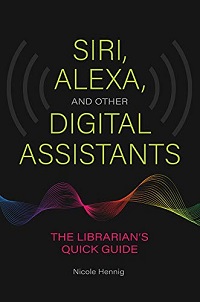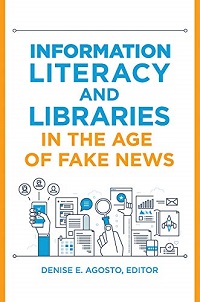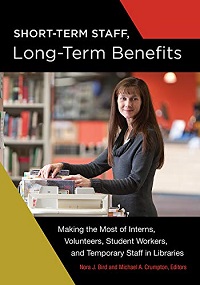Archival Futures, Digital Assistants, Information Literacy, Short-Term Employment Opportunities | Professional Reading Reviews
Highly recommended for archivists, records managers, and other information professionals; those unfamiliar with voice computing will gain a basic understanding of the technology and its potential uses in library settings; an engaging and intellectually stimulating read highly recommended for all librarians; library managers will find this useful information for designing rewarding short-term work experiences
 Archival Futures. Facet. Aug. 2018. 176p. ed. by Caroline Brown. index. ISBN 9781783301829. pap. $98.99; ebk. ISBN 9781783302192. PRO MEDIA
Archival Futures. Facet. Aug. 2018. 176p. ed. by Caroline Brown. index. ISBN 9781783301829. pap. $98.99; ebk. ISBN 9781783302192. PRO MEDIA
The nine essays in this compilation, edited by Brown (assistant director, Library & Learning Ctr. & Information, Univ. of Dundee, Scotland; Archives and Recordkeeping: Theory into Practice), written by leading experts in the field of archives and records management, explore the impact of technology on archival practice and the even greater changes likely to come with innovation. Rather than assuming that the increasing automation of archival tasks spells the profession’s doom, the authors find new opportunities for archivists willing to broaden the focus of their work and take a fresh look at conventional processes. Kate Theimer, who runs the blog ArchivesNext, predicts an increased emphasis on contextualization and filling archival silences once technology has evolved to take on more of the archivist’s most time-consuming tasks. Geoffrey Yeo (archives & records management specialist, Univ. Coll. London) debates the need for traditional methods of selection in a world where digital storage grows ever cheaper and more capacious. Sonia Ranade (head of digital archiving, the National Archives, UK) discusses new models for access and discovery integrating multiple collections and repositories. These are but a few of the standout pieces in this thought-provoking, inspiring collection.
VERDICT Highly recommended for archivists, records managers, and other information professionals.—Sara Shreve, Newton, KS
 Hennig, Nicole. Siri, Alexa, and Other Digital Assistants: The Librarian’s Quick Guide. Libraries Unlimited: Teacher Ideas. Sept. 2018. 89p. notes. index. ISBN 9781440867255. pap. $35; ebk. ISBN 9781440867262. PRO MEDIA
Hennig, Nicole. Siri, Alexa, and Other Digital Assistants: The Librarian’s Quick Guide. Libraries Unlimited: Teacher Ideas. Sept. 2018. 89p. notes. index. ISBN 9781440867255. pap. $35; ebk. ISBN 9781440867262. PRO MEDIA
Approximately 20 percent of U.S. adults have access to a digital assistant, and service adoption rates are growing faster than those experienced by TV or the Internet, making this new technology the next revolution in computing. Librarians should be familiar with the trend, argues Hennig ( Keeping Up with Emerging Technologies), who here discusses the most popular voice assistants and smart speakers and covers the technology’s benefits and security concerns. The book suggests a number of advantages to voice computing in libraries, such as enabling patrons to search the catalog and renew materials. Perhaps this technology’s greatest promise, Hennig says, is in its use by those with visual or mobility impairments.
VERDICT Those completely unfamiliar with voice computing will gain a basic understanding of the technology and its potential uses in library settings. However, they may question whether the information gained from such a slim volume is worth the hefty cost. Librarians already aware of the technology and its ramifications can skip this title.—Lydia Olszak, Bosler Memorial Lib., Carlisle, PA
 Information Literacy and Libraries in the Age of Fake News. Libraries Unlimited: Teacher Ideas. Oct. 2018. 184p. ed. by Denise E. Agosto. notes. index. ISBN 9781440864186. pap. $65; ebk. ISBN 9781440864193. PRO MEDIA
Information Literacy and Libraries in the Age of Fake News. Libraries Unlimited: Teacher Ideas. Oct. 2018. 184p. ed. by Denise E. Agosto. notes. index. ISBN 9781440864186. pap. $65; ebk. ISBN 9781440864193. PRO MEDIA
Agosto (director, Master of Library & Information Science program, Drexel Univ.; Urban Teens in the Library) presents a collection of 13 essays on information literacy in an age in which unreliable or false data circulates quickly. The contributors, mostly academic, school, and public librarians, tackle a range of topics, including history, critical thinking, economic inequality, intellectual freedom, media literacy, and more. Reflecting the complexity of the subject, the writers define “fake news” in different ways and have divergent opinions on how to combat it—readers may feel as though they’re attending an animated conference panel. For instance, a chapter on the importance of not censoring fake news emphasizes how honing information literacy skills can prepare patrons to evaluate texts for themselves, while the following section argues that these sources shouldn’t be afforded the same protections as other forms of speech.
VERDICT This engaging and intellectually stimulating read is highly recommended for all librarians as well as those interested in exploring the issue of fake news.—Melissa Engleman, Univ. of Tennessee at Martin
 Short-Term Staff, Long-Term Benefits: Making the Most of Interns, Volunteers, Student Workers, and Temporary Staff in Libraries. Libraries Unlimited: Teacher Ideas. Sept. 2018. 184p. ed. by Nora J. Bird & Michael A. Crumpton. index. ISBN 9781440841767. pap. $65; ebk. ISBN 9781440841774. PRO MEDIA
Short-Term Staff, Long-Term Benefits: Making the Most of Interns, Volunteers, Student Workers, and Temporary Staff in Libraries. Libraries Unlimited: Teacher Ideas. Sept. 2018. 184p. ed. by Nora J. Bird & Michael A. Crumpton. index. ISBN 9781440841767. pap. $65; ebk. ISBN 9781440841774. PRO MEDIA
Libraries are often approached by individuals interested in volunteering or interning, but if managers are not prepared, short-term staff can cost the organization more than they benefit it. Editors Bird (library & information studies, Univ. of North Carolina at Greensboro) and Crumpton (assistant dean, administrative svcs., Univ. of North Carolina at Greensboro) draw on their experience with the Real Learning Connections project, which offers students in the information studies program the opportunity to work in the university libraries, to argue for the advantages of using temporary staff. They focus on the importance of learning both for the individual and for the organization and describe and promote the creation of a learning organization as a method for libraries to adjust to change. Contributors look at employing interim workers, including grant personnel, fellowships, internships, consultants, student staff, volunteers, and temporary staff. Overall, the book covers many types of employees and collections, including academic and public libraries and special collections and archives.
VERDICT Library managers will find this useful information for designing rewarding short-term work experiences.—Judy Solberg, Sacramento, CA
ALREADY A SUBSCRIBER? LOG IN
We are currently offering this content for free. Sign up now to activate your personal profile, where you can save articles for future viewing









Add Comment :-
Comment Policy:
Comment should not be empty !!!